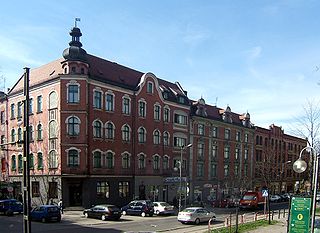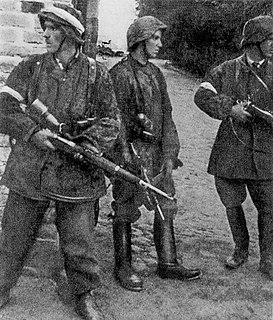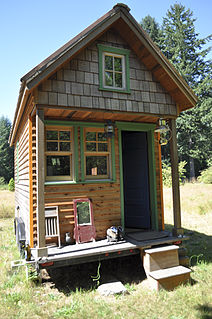Markot (Ruch Wychodzenia z Bezdomnosci - Movement Out of Homelessness) is a Polish social movement, aimed at helping homeless people across Poland. It was founded by Marek Kotanski, a charity worker and campaigner on behalf of disadvantaged people and was based on an idea from late 1980s and early 1990s. First center of the movement was opened in a village of Lutynka, another one was opened in Jeleni Ruczaj, then a School of Life was founded in the village of Wandzin. The movement was legalized in 1994, in the same year in Warsaw, a Center of Help was opened. It is estimated that in the 1990s, some 50% of beds for Polish homeless persons were administered by Markot. Marek Kotanski, leader of the movement, established Day of the Homeless (April 14) as well as an honorary title Friend of the Homeless.

Solidarity, full name Independent Self-Governing Trade Union "Solidarity", is a Polish trade union founded in August 1980 at the Lenin Shipyard in Gdańsk, Poland. Subsequently, it was the first independent trade union in a Warsaw Pact country to be recognised by the state. The union's membership peaked at 10 million in September 1981, representing one-third of the country's working-age population. Solidarity's leader Lech Wałęsa was awarded the Nobel Peace Prize in 1983 and the union is widely recognised as having played a central role in the end of Communist rule in Poland.

Ruda Śląska is a city in Silesia in southern Poland, near Katowice. It is a district in the Upper Silesian Metropolitan Union, a metropolis with a population of two million. It is in the Silesian Highlands, on the Kłodnica River.

Marek Kotański, was a Polish charity worker and campaigner on behalf of disadvantaged people, including the homeless and those with HIV. He died in a car accident in Nowy Dwór Mazowiecki, near Warsaw.

Oświęcim is a town in the Lesser Poland province of southern Poland, situated 50 kilometres (31 mi) west of Kraków, near the confluence of the Vistula (Wisła) and Soła rivers. The town is commonly known for being the site of the Auschwitz concentration camp during World War II, when Poland was occupied by Nazi Germany.

Ostrów Wielkopolski is a city in west-central Poland with 71 560 inhabitants (2020), situated in the Greater Poland Voivodeship; the seat of Ostrów Wielkopolski County. It is the fifth-largest city in the voivodeship after Poznań, Kalisz, Konin and Piła.

The Order of the Smile is an international award given by children to adults distinguished in their love, care and aid for children.

A tent city is a temporary housing facility made using tents or other temporary structures.
Monar is a Polish non-governmental organization focused on helping drug addicts, the homeless, those who are HIV positive or who have AIDS, and many other groups of people who need help. It was established formally as an association in 1981.

Tompkins Square Park is a 10.5-acre (4.2 ha) public park in the Alphabet City portion of East Village, Manhattan, New York City. The square-shaped park, bounded on the north by East 10th Street, on the east by Avenue B, on the south by East 7th Street, and on the west by Avenue A, is abutted by St. Marks Place to the west. The park opened in 1834 and is named for Daniel D. Tompkins, Vice President of the United States.

Leśni ludzie is an informal name applied to some anti-German partisan groups that operated in occupied Poland during World War II, being a part of Polish resistance movement.

Marek Edelman was a Polish political and social activist and cardiologist. Edelman was the last surviving leader of the Warsaw Ghetto Uprising and, long before his death, was the last one to stay in Poland despite harassment by the Communist authorities.

Horní Suchá (help·info) is a municipality and village in the Karviná District in the Moravian-Silesian Region of the Czech Republic. It has about 4,400 inhabitants. Polish minority makes up 17.1% of the population.

The "cursed soldiers" or "indomitable soldiers" is a term applied to a variety of anti-Soviet and anti-communist Polish resistance movements formed in the later stages of World War II and its aftermath by members of the Polish Underground State. This all-encompassing term for a widely heterogeneous movement was introduced in the early 1990s.

The Battle of Kuryłówka, fought between the Polish anti-communist resistance organization, National Military Alliance (NZW) and the Soviet Union's NKVD units, took place on May 7, 1945, in the village of Kuryłówka, southeastern Poland. The battle ended in a victory for the underground Polish forces.

Anarchism in Poland first developed at the turn of the 20th century under the influence of anarchist ideas from Western Europe and from Russia.

The tiny-house movement is an architectural and social movement that advocates for downsizing living spaces, simplifying, and essentially "living with less." According to the 2018 International Residential Code, Appendix Q Tiny Houses, a tiny house is a "dwelling unit with a maximum of 37 square metres of floor area, excluding lofts." While tiny housing primarily represents a return to simpler living, the movement was also regarded as a potential eco-friendly solution to the existing housing industry, as well as a feasible transitional option for individuals experiencing a lack of shelter.
Picture the Homeless (PTH) is an American homeless person–led rights organization founded in 1999 by Lewis Haggins and Anthony Williams. It focuses on human rights, housing, police violence and other social justice issues. It was housed originally in Judson Memorial Church, which still hosts its Longest Night of the Year memorial event, and was located for a time in El Barrio and 2427 Morris Avenue in the Bronx. It is currently based at 104B E 126th Street in Manhattan.

Konrad Krajewski is a Polish cardinal of the Catholic Church. He was a papal master of ceremonies from 1998 to 2013. In 2013 he was appointed as the papal almoner.

The V-2 missile launch site, Blizna was the site of a World War II German V-2 missile firing range. Today there is a small museum located in the Park Historyczny Blizna in Blizna, Poland. After the RAF strategic bombing of the V-2 rocket launch site in Peenemünde, Germany, in August 1943, some of the test and launch facilities were relocated to Blizna in November 1943. The first of 139 V-2 launches was carried out from the Blizna launch site on 5 November 1943.